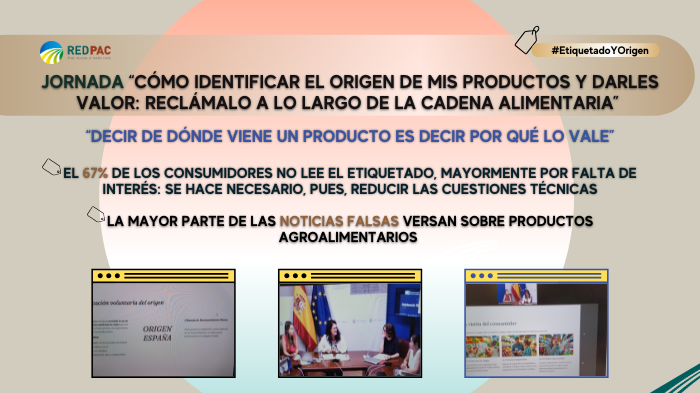
14 de July de 2025
Calidad y cadena alimentaria
Resiliencia y competitividad
The informative workshop "How to identify the origin of my products and add value to them: claim it throughout the food chain" was held virtually.
- The informative workshop "How to identify the origin of my products and add value to them: claim it throughout the food chain" was held virtually.
- The objective of the conference was to provide information on current legislation regarding labeling, with special attention to the mention "Origin Spain."
"Saying where a product comes from means saying why it's valuable." With this statement of intent, the PAC Network organized the virtual conference "How to identify the origin of my products and add value to them: claim it throughout the food chain" on July 8. The objective was:
Explain what can and cannot be done with the origin labeling rules .
Make known the products that already have mandatory origin labeling.
Explain the possibility of indicating the origin of all products, on a voluntary basis: Mention “ Origin Spain ”.
Share success stories and examples.
The standard stipulates that all food must include, as a minimum, the following mandatory information on the label:
Product name: legal or usual name of the food.
List of ingredients: in descending order of weight. Allergens should be highlighted.
Net quantity: In volume (liters, milliliters) or weight (kg, g).
Minimum durability or expiration date.
Special conditions of conservation or use.
Name or business name and address of the food operator.
Place of origin or provenance: mandatory if its omission may be misleading.
Instructions for use
Alcohol content: only for beverages with more than 1.2% alcohol.
These standards are complemented by the European Regulation , which governs food information provided to consumers throughout the European Union (EU), including origin labeling. Specifically, one of the key messages launched by the Ministry of Agriculture, Fisheries, and Food (MAPA) was the need to harmonize national regulations with European ones.
Labeling challenges
The conference kicked off with a presentation by Ana Rodríguez Castaño, Secretary General of Agricultural Resources and Food Safety at MAPA, who provided the following information: 67% of consumers do not read labels, often due to a lack of interest or excessive technical jargon, or even because the print seems too small. Therefore, it is essential to summarize information in the clearest and most accessible way possible to connect with consumers. Secondly, it is necessary to combat misinformation: most "fake news" on social media related to agri-food [EV1] revolves around agri-food products and their standards of quality or origin.
The following interventions focused on introducing attendees to the Regulation on the provision of food information to consumers through origin labeling, as well as its national regulations . There was also time to explain the specific marketing regulations for products requiring mandatory indication of origin in the EU and Spain.
All these interventions can be found here .
Conclusions
The MAPA noted that:
✅ Origin labeling is supported.
✅ The use of voluntary source information is encouraged.
Ultimately, origin matters. Not just for identity, but for value and trust. The conference concluded that origin labeling is a powerful tool for providing traceability, transparency, and connection with the "Spain" brand.









